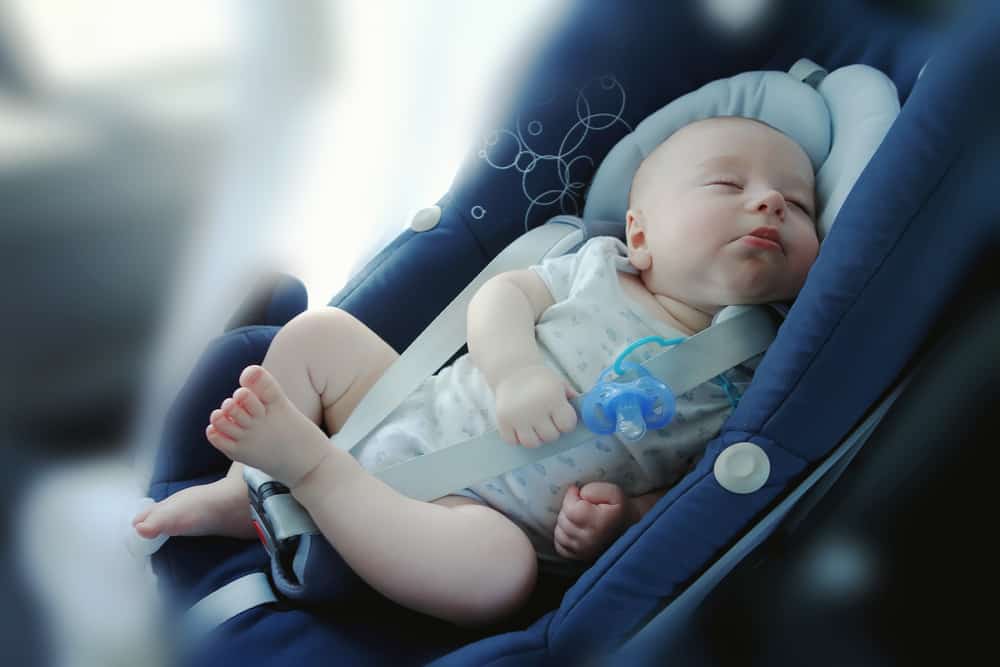It’s no mean feat to convince your overtired baby to settle and sleep, and as a parent, it’s also very frustrating. The harder you try to calm your overtired baby, the more they’ll protest. It isn’t personal – they just can’t help themselves – but nevertheless it can be annoying and, if it carries on night after night, it can be extremely exhausting.
If a baby gets overtired, their body’s natural stress response system enters high gear. This triggers adrenaline (the fight-or-flight hormone) and cortisol (the hormone that regulates their sleep-wake cycle) to flood their body. When both of these hormones are at an elevated level, it’s not realistic to expect your little one to lie down and sleep. In fact, when babies are overtired, they find it very difficult to remain asleep even once they’ve finally dropped off.
A baby who is overtired will become trapped in a cycle of poor sleep, which leads to even more tiredness which, again, leads to even less sleep. It’s no wonder, then, that so many frustrated parents are keen to find a solution to this all-too-familiar problem.
- Hormones, Your Baby, and Their Sleep/Wake Cycle
- Why Do Babies Get Overtired So Easily?
- How Can I Tell if My Baby Is Overtired?
- If My Baby Is Overtired, How Can I Help Him Sleep?
- Am I Doing Something That Makes It Harder for My Baby to Sleep?
- If I’m Out With My Baby When It’s Their Nap Time, Should I Let Them Sleep?
- Does Sleep Training Work for Babies Who Are Overtired?
- How Will I Recognize the Cry of an Overtired Baby?
- Can I Stop My Baby From Becoming Too Overtired?
- How Much Sleep Will a Baby Need?
- Helping an Overtired Baby to Sleep
Hormones, Your Baby, and Their Sleep/Wake Cycle
It’s important to understand the way in which neurotransmitters and hormones affect sleep if you want to know how best to help your little one to get some rest. s
The primary hormones governing sleep are cortisol and melatonin. These levels change during the day and this makes it easier to sleep at particular times. The hormone cortisol keeps us alert and awake. It reaches its highest level at 8 am and then drops off throughout the day. Conversely, melatonin levels increase when light is absent and it prepares us for falling asleep.
Why do you need to know this? Well, if you can work with your baby’s hormones, you’re part of the way towards winning the sleep battle.
If you want to get a baby to sleep easily, it’s important to assist their brain with the release of melatonin. Avoid putting a baby down for sleep when their cortisol level is high.
Why Do Babies Get Overtired So Easily?
Babies need to sleep regularly so they can process the things that they have learned during their day. This means that babies only have short periods of being awake.
Newborns are only able to cope with around 45 minutes of awake time or stimulation before they become tired. Meanwhile, 6-month-olds are able to cope with around 2 hours of stimulation/awake time and a toddler is capable of being awake for four or five hours before needing to sleep.
Once your infant’s awake time has drawn to its close, your little one will start becoming drowsy and will be ready for sleep. If you’re able to settle your baby down at this point, they’ll fall asleep more easily as their melatonin level will overtake their cortisol level.
If you allow your baby to stay awake past this age-appropriate awake time, though, they will need to access the hormones that promote alertness. Thus, cortisol and adrenaline will be released. Those stress hormones won’t be helpful when you need your baby to go to sleep and they explain why an overtired baby will always fight sleep.
How Can I Tell if My Baby Is Overtired?
Even at a very young age, babies are intelligent enough to be able to communicate with you. Although it isn’t always easy to tell whether your little one is tired or not, there are a few signs you can look out for that will make it easier.

- Yawning – just like adults, babies will yawn when they’re feeling tired. It isn’t actually known whether yawning has any purpose, but it’s thought that yawning could wake the brain up.
- Face touching – tired infants often pull their ears or rub their face and eyes.
- Clinginess – a tired baby may determinedly hold onto you.
- Whimpering – a tired baby may whimper before moving onto full-blown crying.
- Loss of interest – when your baby loses interest and withdraws, this is a sign of tiredness.
If you fail to spot these signs and help your baby to get off to sleep, they’ll progress to the overtired stage. There are signs that this has happened, including:
- More yawning
- More crying
- Lower pain and frustration threshold
- Difficulty in soothing
- Taking catnaps and having fitful sleep
- Going to sleep at the wrong time
- Abundant energy and overactivity
If My Baby Is Overtired, How Can I Help Him Sleep?
If your little one has become overtired, you need to find a way to settle them down.

Studies have shown that swaddling a baby is an excellent way to promote good sleep since swaddling can stop your baby from startling himself awake if his arms and legs jerk involuntarily. It’s also thought swaddling may remind babies of being safe and comfortable inside the womb. Swaddling is a great solution for newborns and small infants, but once your baby can roll it is no longer effective and is bad for them.
Some other options to help your baby to sleep include:
- Holding your little one close so they can hear the sound of your heart beating.
- Giving your baby a pacifier.
- Rocking your little one gently in a stroller or in your arms. Avoid overdoing it though or you will stop them from sleeping.
- Playing soft music, white noise or singing quietly.
- Darkening the room so stimulation is reduced.
Am I Doing Something That Makes It Harder for My Baby to Sleep?
Although most parents are keen to help their baby to sleep well, there are some things that you might be unwittingly doing that are making your baby overtired and preventing restful sleep.
The most common problem is waiting too long before putting the baby down to sleep. The second most common is interfering excessively in the falling asleep process. Although you may feel that rocking, bouncing and holding your baby will help him or her to sleep well, in fact these things may be creating negative sleep associations or sleep crutches which, in the long-run, make it more difficult for babies to learn the all-important skills of self-soothing, and falling asleep and staying asleep on their own.
If I’m Out With My Baby When It’s Their Nap Time, Should I Let Them Sleep?
If you happen to be out and about at the time that your baby would normally sleep or take a nap, it’s best to encourage your baby to get some sleep wherever they may be, whether that be in the car, in their stroller or at a friend’s house.

If you wait until you return home before putting your little one down to sleep, there’s a good chance your baby will be overtired and much more difficult to console. Bear in mind, though, that naps on the move aren’t as restorative, so the next nap time or bedtime should come earlier than usual.
Does Sleep Training Work for Babies Who Are Overtired?
Although sleep training can be beneficial in helping infants to get themselves off to sleep, it can cause problems if you have a perpetually overtired baby. You should avoid sleep training anyway until your little one has passed the newborn stage.
It’s better to try to get your little one on track by doing your utmost to help him or her to sleep for the right amount of hours for their age before you embark on any sleep training exercises.
Establishing a consistent schedule for bedtime and naps is the best course of action. Limit stimulation before bed and putting in place a regular bedtime routine all help.
It’s far simpler to sleep train your baby when he or she isn’t overtired as overtired babies will sleep less soundly in general and will find it more difficult to get off to sleep in the first place.
How Will I Recognize the Cry of an Overtired Baby?
You probably already know by now that your little one has different cries that he or she uses to tell you all about his or her different needs. You may already recognize their pain cry and hunger cry, and their tired cry is just another sound you’ll learn to spot.
Tired crying will sound nasal and whiny – and it is continuous, building up over time in intensity. An overtired baby’s cry is very like a regular tired cry but it will usually be accompanied by symptoms of overtiredness such as becoming easily frustrated and struggling to settle down.
If you closely watch your baby then respond promptly when you spot their sleep cues, you can help to prevent the problem of your little one becoming overtired. If your baby can get sufficient night time and daytime sleep, this will help to solve the overtired baby issue. Once baby gets back on track, you’ll find that you will enjoy far more restful nights of sleep.
Can I Stop My Baby From Becoming Too Overtired?
If you can develop a sleep schedule that fits around your little one’s natural patterns, this is a good way of stopping your baby from getting overtired. Observe their own natural patterns of sleep and track when they’re falling asleep every day, both at night and for naps. Bear in mind that before your infant reaches six months of age they won’t have a strict sleep schedule. After this point, though, developing an effective sleep schedule usually becomes easier.
Try to put your baby down for a nap and to sleep at night at a similar time every day, even if sometimes they don’t appear to be tired at that time. As required, adjust their schedule if they fail to settle and go to sleep routinely or if they’re waking earlier than expected.
Once you start to recognize your baby’s natural schedule, it’ll become easier to spot your little one’s sleep cues so you can start settling them down long before they become overtired.
How Much Sleep Will a Baby Need?
Although it doesn’t seem that way, newborns usually sleep for at least 16 hours each day. Unfortunately, those hours only come in short stretches at any one time. Once your baby reaches six months, though, they will probably have settled into their own sleep cycle which allows you to get the rest you’ve been hoping for.
All babies need to sleep for a certain amount of time so that they can grow properly and their brains can develop. The length of time will vary depending on the age of your baby:
Babies of 0-3 months require between 16 and 17 hours of sleep.
Babies of 4-6 months require between 14 and 15 hours of sleep.
Babies of 6-12 months require between 13 and 14 hours of sleep.
Once your baby has reached a year old, he will still need to have between 11 – 14 hours of restful sleep in every 24 hour period until he reaches the age of 2.
Helping an Overtired Baby to Sleep
It’s clear that sleep is absolutely vital for all of us, but especially for babies. While the body is strengthening and restoring its muscles and tissues during sleep, the mind is working on processing and consolidating the new information it’s received during its waking hours, and babies have a lot to process in those early weeks and months of life.
By following the advice here, you can help to prevent your little one from becoming overtired and, if it happens from time to time, you will at least know how to get your overtired baby off to rest.
